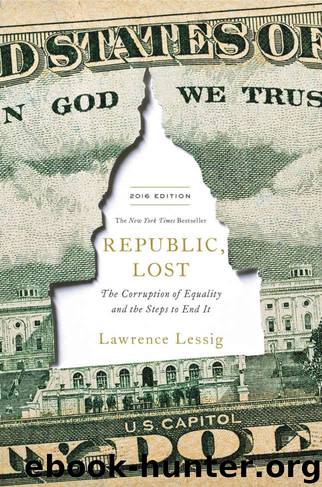Republic, Lost: Version 2.0 by Lawrence Lessig

Author:Lawrence Lessig [Lessig, Lawrence]
Language: eng
Format: epub
Tags: Political Science / Civics & Citizenship, Political Science / Political Process / Campaigns & Elections
Publisher: Grand Central Publishing
Published: 2015-10-20T07:00:00+00:00
1. Making Government Small
When Al Gore was vice president, his policy team had a proposal to deregulate the Internet. As a “network of networks,” the Internet lives atop other physical networks. In 1994, some of those networks were telephone networks; some were (promised to be) cable networks. The bits running on the telephone lines (both the dial-up connections and DSL) were governed by Title II of the Communications Act of 1934. The bits running on cable lines were regulated by Title VI.
Title II and Title VI are very different regulatory regimes. One has an extensive regulatory infrastructure (Title II); the other has a very light (with respect to access at least) regulatory infrastructure (Title VI). So Gore’s idea was to put both kinds of Internet access under the same regulatory title, Title VII, and to give that title the smallest regulatory footprint it could have. Not no regulation, but much less regulation than is contemplated today by “network neutrality” advocates.
Gore’s team took the idea to Capitol Hill. The Hill didn’t like the idea. As his chief lobbyist for the idea recounted to me, “Hell no! If we deregulate these guys, how are we going to raise any money from them?”
As I said, Reagan often spoke as if it were the bureaucrats who were pushing to increase the size of government. These bureaucrats would push and push and push until they regulated absolutely everything they could.
What Reagan didn’t think about was how members of Congress—even Reagan Republicans—might themselves become the problem. How Republicans and Democrats alike have an interest in extending the reach of regulation, because by increasing the range of regulated interests, you increase the number who have an interest in trying to influence federal regulation. For how is that influence exercised? Through the gift economy enabled by Santa, the lobbyist. And through, as Peter Schweizer puts it, the extortion lobby of campaign funding.
Now, of course no one would say that Congress regulates simply for the purpose of creating fund-raising targets—though that was the clear implication of Ryan Grim and Zach Carter’s story about the perennial battles among potentially large funders that get waged in Congress.20 But souls on the Right—especially those enamored of incentive theories of human behavior—should recognize that the cause of growing government is more likely tied to Congress’s thinking about the targets of fund-raising than bureaucrats angling to increase the scope of their work. Conservatives should see that having lots of targets of regulation is actually a good way to have lots of targets for fund-raising. And thus, so long as fund-raising is a central obligation of members of Congress, there is a conflict between the interests of small government activists and the interests of the fund-raising-dependent congressmen.
This point is even clearer when you think about it from the perspective of the targets of this fund-raising. According to one survey, almost 60 percent of Americans believe that when members of Congress meet with regulators and other government officials, “they do so to help their friends and hurt their political opponents.
Download
This site does not store any files on its server. We only index and link to content provided by other sites. Please contact the content providers to delete copyright contents if any and email us, we'll remove relevant links or contents immediately.
The Secret History by Donna Tartt(18998)
The Social Justice Warrior Handbook by Lisa De Pasquale(12177)
Thirteen Reasons Why by Jay Asher(8873)
This Is How You Lose Her by Junot Diaz(6855)
Weapons of Math Destruction by Cathy O'Neil(6248)
Zero to One by Peter Thiel(5764)
Beartown by Fredrik Backman(5708)
The Myth of the Strong Leader by Archie Brown(5481)
The Fire Next Time by James Baldwin(5409)
How Democracies Die by Steven Levitsky & Daniel Ziblatt(5200)
Promise Me, Dad by Joe Biden(5128)
Stone's Rules by Roger Stone(5065)
A Higher Loyalty: Truth, Lies, and Leadership by James Comey(4937)
100 Deadly Skills by Clint Emerson(4899)
Rise and Kill First by Ronen Bergman(4758)
Secrecy World by Jake Bernstein(4727)
The David Icke Guide to the Global Conspiracy (and how to end it) by David Icke(4684)
The Farm by Tom Rob Smith(4485)
The Doomsday Machine by Daniel Ellsberg(4473)
